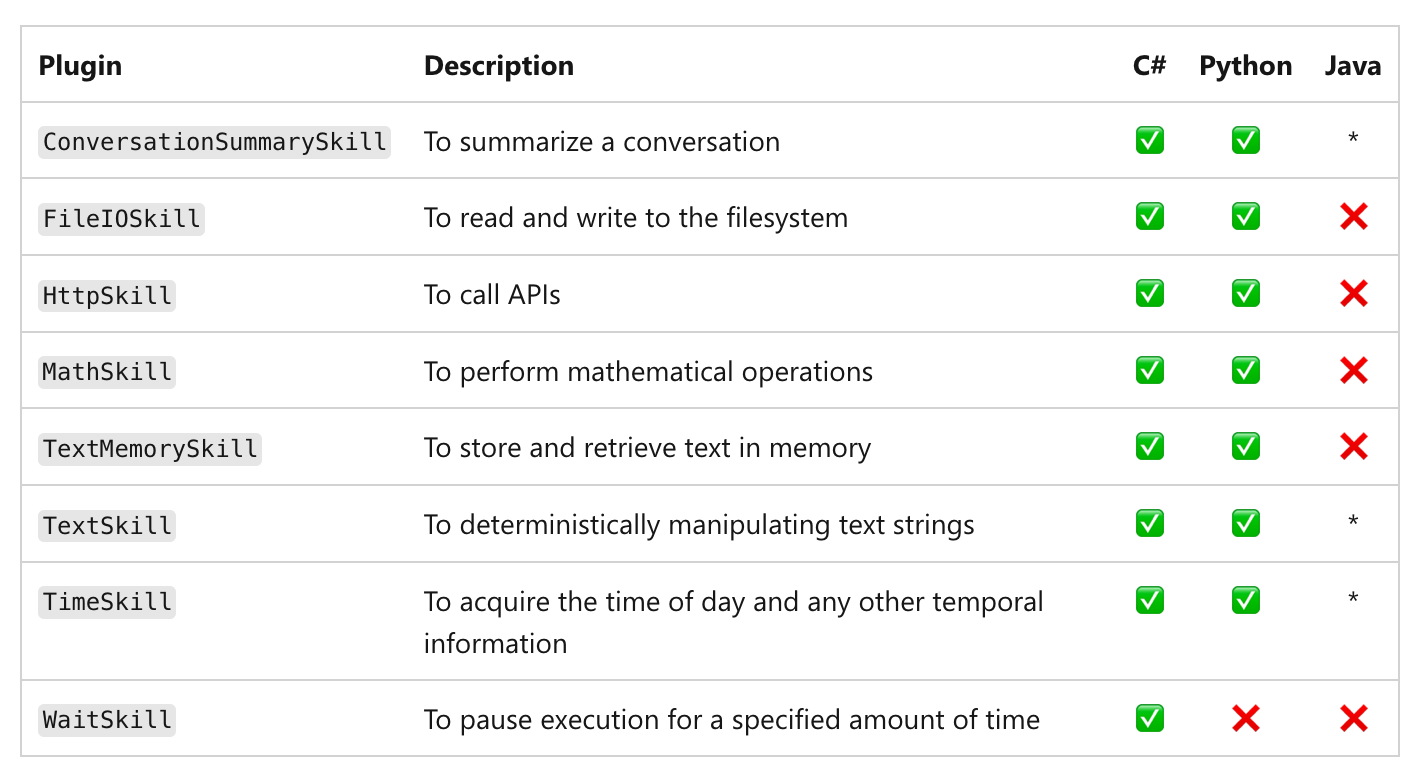import semantic_kernel as sk
from semantic_kernel.connectors.ai.open_ai import OpenAIChatCompletion, OpenAITextEmbedding
from semantic_kernel.connectors.ai.open_ai import AzureChatCompletion, AzureTextEmbedding
from semantic_kernel.planning import ActionPlanner
from semantic_kernel.planning import SequentialPlanner
from semantic_kernel.core_skills.text_skill import TextSkill
from semantic_kernel.planning import SequentialPlanner
from semantic_kernel.core_skills.text_skill import TextSkill
from semantic_kernel.core_skills import FileIOSkill, MathSkill, TextSkill, TimeSkill
from IPython.display import display, MarkdownCore Plugins
in Semantic Kernel
Jan Kirenz
Core Plugins

We want to have a vat of plugins … and then find the right plugin to fit the goal …
You can find more about the predefined plugins used below here.
Setup
Python
Kernel
kernel = sk.Kernel()
api_key, org_id = sk.openai_settings_from_dot_env()
kernel.add_text_completion_service(
"openaicompletion", OpenAIChatCompletion("gpt-3.5-turbo", api_key, org_id))
kernel.add_text_embedding_generation_service(
"openaiembedding", OpenAITextEmbedding("text-embedding-ada-002", api_key, org_id))Add Core Plugins

Import plugins
- Action Planner is a simple tool which can find the right tool to get things done
- Adding the tools for the kernel to do math, to read/write files, to tell the time, and to play with text:
Example Plugins
Math
- Finding the most similar function available to get that done…
Date
Text
Text example Poem
Custom Plugin LiterateFriend
Use Sequential Planner
Task
- This will require two plugins (write poem and translate)
Call planner
Obtain result
Output
Display output
✅ Step 1 used function `ShortPoem`
✅ Step 2 used function `Translate`
✨ Generated result from the ask:
Tomorrow is Valentine's day. I need to come up with a poem. Translate the poem to German.
Rosen sind rot, Veilchen sind blau, Valentinstag ist da, was wirst du tun? Kaufe Schokolade und Blumen oder schreibe einen Liebesbrief, Vergiss nur nicht, es alles besser zu machen.
Wenn du Single bist, keine Sorge, Gönn dir selbst, zu...- mmmhhh, maybe lost in translation 🙂
Take a closer look at the output
for index, step in enumerate(plan._steps):
print(f"✅ Step {index+1} used function `{step._function.name}`")
trace_resultp = True
if trace_resultp:
print("Longform trace:\n")
for index, step in enumerate(plan._steps):
print("Step:", index)
print("Description:", step.description)
print("Function:", step.skill_name + "." + step._function.name)
print("Output vars:", step._outputs)
if len(step._outputs) > 0:
print(" Output:\n", str.replace(
result[step._outputs[0]], "\n", "\n "))
display(
Markdown(f"## ✨ Generated result from the ask: {ask}\n\n---\n" + str(result)))Take a closer look at the output
✅ Step 1 used function `ShortPoem`
✅ Step 2 used function `Translate`
Longform trace:
Step: 0
Description: Turn a scenario into a short and entertaining poem.
Function: LiterateFriend.ShortPoem
Output vars: ['POEM']
Output:
Roses are red, violets are blue,
Valentine's Day is here, what will you do?
Buy chocolates and flowers, or write a love letter,
Just don't forget, to make it all better.
If you're single, don't you fret,
Treat yourself, to
Step: 1
Description: Translate the input into a language of your choice
Function: LiterateFriend.Translate
Output vars: ['RESULT__TRANSLATED_POEM']
Output:
Rosen sind rot, Veilchen sind blau,
Valentinstag ist da, was wirst du tun?
Kaufe Schokolade und Blumen oder schreibe einen Liebesbrief,
Vergiss nur nicht, es alles besser zu machen.
Wenn du Single bist, keine Sorge,
Gönn dir selbst, zu...Acknowledgments
This tutorial is mainly based on the excellent course “How Business Thinkers Can Start Building AI Plugins With Semantic Kernel” provided by John Maeda and Andrew Ng
What’s next?
Congratulations! You have completed this tutorial 👍
Next, you may want to go back to the lab’s website
Jan Kirenz